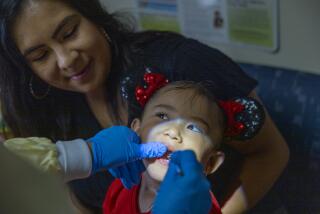OXNARD : Clinic Gives Children Free Dental Care
- Share via
More than 100 children in need of dental care are getting free checkups during a weeklong clinic aimed at helping needy schoolchildren in Oxnard.
The students were selected during screenings at 17 elementary schools in Oxnard and Ocean View to determine who was most in need of care, said Oxnard School District Nurse Linda Butcher.
“Some have more than a dozen cavities and many have abscesses and other problems,” Butcher said. “We can only afford to take the most severe cases.”
The free mobile clinic, held at Juanita Elementary School in Oxnard’s La Colonia district, is run by the USC Dental School. The clinic makes annual visits to poor areas in cities from Kern County to Tijuana.
Graduate students at the dental school volunteer to provide the work for the program, which is partly funded by $20,000 in grants from the county and school district and donations from parents and local dentists, Butcher said.
Basic treatment started Friday when each child received an exam, cleaning, X-rays and oral hygiene instruction. Children are returning throughout the week for fillings, crowns and, in some cases, root canals.
Randall Niederkohr, a USC professor of dentistry, oversees the 13 dental students who are providing the services. “A lot of times kids don’t even have a toothbrush when they come here,” Niederkohr said. “At least when they leave they have that.”
Blanca Lemus, 7, got a toothbrush and an unpleasant surprise when she visited the clinic Tuesday and had to have a tooth pulled.
Her face puffy and her mouth stuffed with cotton, the Juanita school first-grader frowned as she clutched the brown, gauze-wrapped baby tooth.
But Blanca’s treatment is far from over. According to Michael Bodensteiner, the dental student who worked on her teeth, Blanca still needs “several crowns and a bunch of fillings.”
Bodensteiner said he will do as much as he can by the end of the week, and then refer Blanca to a local dentist for follow-up care.
“For most of these kids,” Bodensteiner said, “this is just the beginning.”
More to Read
Sign up for Essential California
The most important California stories and recommendations in your inbox every morning.
You may occasionally receive promotional content from the Los Angeles Times.













